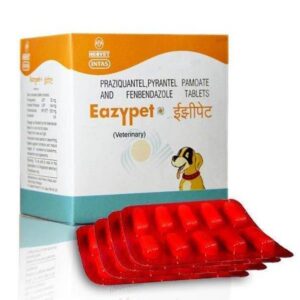PRAZIQUANTEL + PYRANTEL + FENBENDA
Praziquantel: Praziquantel is an anthelmintic medication used to treat various parasitic infections, primarily caused by flatworms such as Schistosoma and liver flukes.
Mechanism of Action:
Praziquantel works by causing muscle paralysis and subsequent dislodgement of the worms from the tissues they are infecting. It disrupts the worms’ tegument (outer layer), ultimately leading to the worms’ death and elimination from the body.
Use:
Praziquantel is primarily used to treat infections caused by Schistosoma species, specifically Schistosoma mansoni, Schistosoma haematobium, and Schistosoma japonicum. It is also effective against liver flukes (Clonorchis sinensis and Opisthorchis viverrini), and other less common flatworm infections.
Dosing:
The recommended dose of praziquantel depends on the specific infection being treated. For schistosomiasis caused by Schistosoma mansoni or Schistosoma haematobium, the typical adult dose is 40 mg/kg of body weight, divided into two or three doses per day. For schistosomiasis caused by Schistosoma japonicum, the dose is typically 60 mg/kg of body weight, divided into three doses per day. For liver flukes, the usual adult dose is 25 mg/kg of body weight, taken three times a day.
Side Effects:
Common side effects of praziquantel include nausea, stomach pain, diarrhea, dizziness, headache, fatigue, and fever. These side effects are usually mild and resolve on their own. Rarely, more serious side effects such as severe allergic reactions, liver problems, and seizures may occur. It is important to consult with a healthcare professional if any severe or persistent side effects occur.
Overall, praziquantel is an effective and commonly used medication for the treatment of parasitic infections caused by flatworms. It is important to follow the recommended dose and instructions provided by a healthcare professional.
Pyrantel: Pyrantel is an anthelmintic (anti-parasitic) medication used to treat certain types of parasitic infections. It is commonly used to treat infections caused by roundworms (Ascaris lumbricoides), hookworms (Ancylostoma duodenale, Necator americanus), and pinworms (Enterobius vermicularis). Pyrantel works by paralyzing the worms, causing them to be expelled from the body through bowel movements.
The dosage of Pyrantel varies depending on the type of infection and the patient’s age. Generally, the recommended dose for adults and children over 12 years old is a single 11 mg/kg dose. For children aged 6 to 12 years, the dose is a single 5 mg/kg dose. For children aged 2 to 5 years, the dose is a single 2.5 mg/kg dose. Pyrantel should be taken with food to increase its absorption and effectiveness.
Some common side effects of Pyrantel include nausea, vomiting, abdominal pain, diarrhea, dizziness, and headache. These side effects are typically mild and temporary. In rare cases, more serious side effects may occur, such as allergic reactions, rash, hives, and difficulty breathing. If any severe or persistent side effects occur, it is advised to seek immediate medical attention.
It is important to note that Pyrantel is not effective against all types of parasitic infections. It should not be used to treat infections caused by whipworms, tapeworms, or protozoa. Additionally, Pyrantel should not be taken by individuals with liver disease or those who are hypersensitive to the drug. Pregnant women and breastfeeding mothers should consult with their healthcare provider before taking Pyrantel.
Overall, Pyrantel is a commonly prescribed medication for the treatment of certain parasitic infections. It is effective, well-tolerated, and widely available. However, as with any medication, it is important to follow the prescribed dosage and consult with a healthcare provider if any concerns or questions arise.
Fenbenda: Fenbendazole is an anthelmintic drug commonly used to treat parasitic infections in animals, including dogs, cats, horses, cattle, sheep, and pigs. It belongs to the benzimidazole class of drugs.
The primary mechanism of action of Fenbendazole is by inhibiting the microtubule function in the parasites, which disrupts their energy metabolism and eventually leads to their death. This drug is effective against various types of worms and parasites, including roundworms, hookworms, whipworms, and certain types of tapeworms.
When it comes to dosing, the specific dosage for Fenbendazole varies depending on the animal being treated and the parasite being targeted. It is available in tablet, powder, and liquid formulations. The dosage is typically determined by the animal’s weight.
Some common side effects seen with Fenbendazole include gastrointestinal disturbances such as vomiting, diarrhea, and loss of appetite. These side effects are generally mild and transient. In some rare cases, hypersensitivity reactions such as skin rashes and allergic reactions may occur, requiring immediate medical attention.
It is important to note that while Fenbendazole is widely used in veterinary medicine, it is not approved for use in humans by regulatory authorities such as the FDA. However, there has been increasing interest in the potential use of Fenbendazole in human cancer treatment, with some studies suggesting its anti-cancer properties. It is crucial to consult a healthcare professional before considering off-label use in humans.


